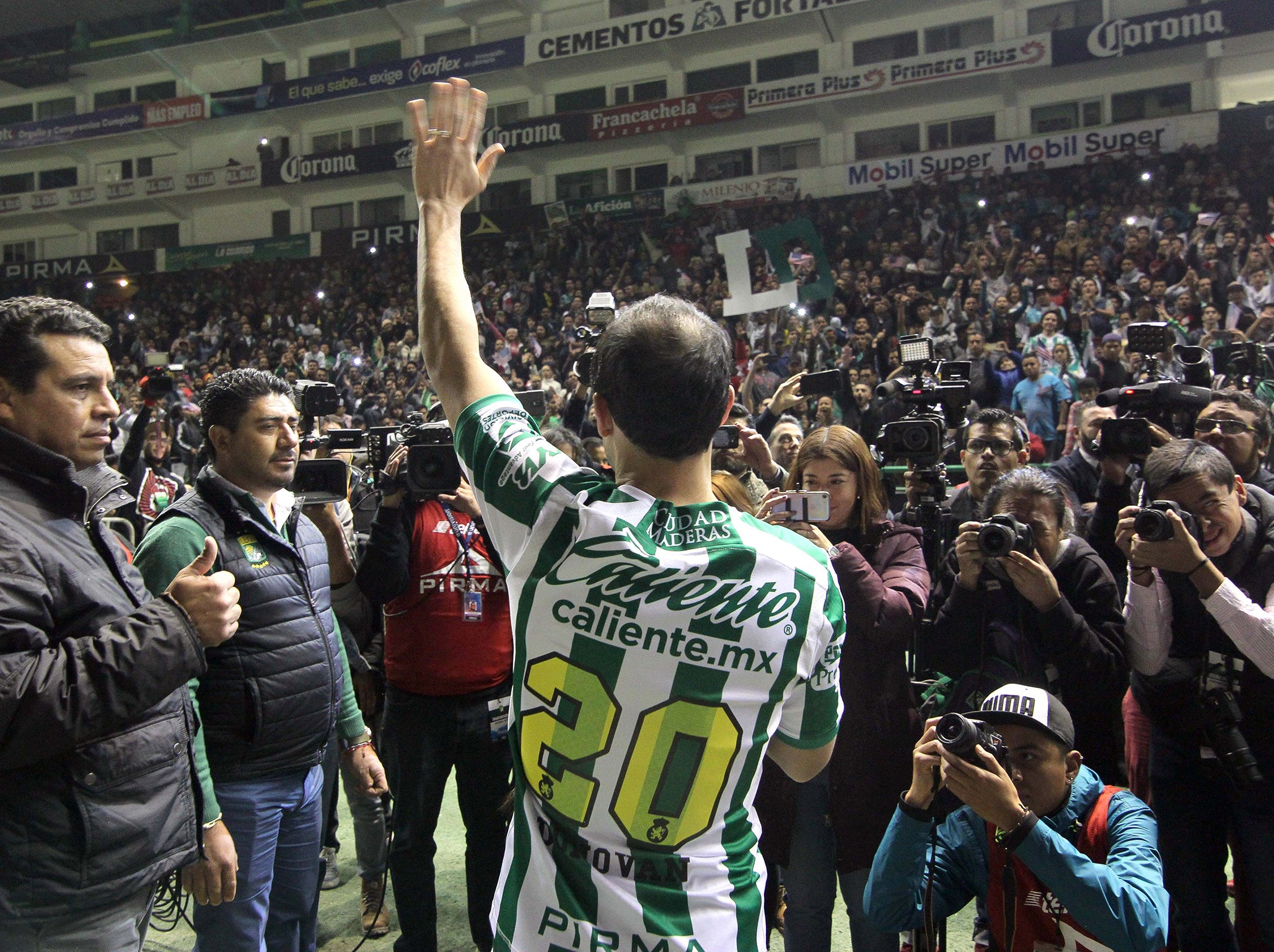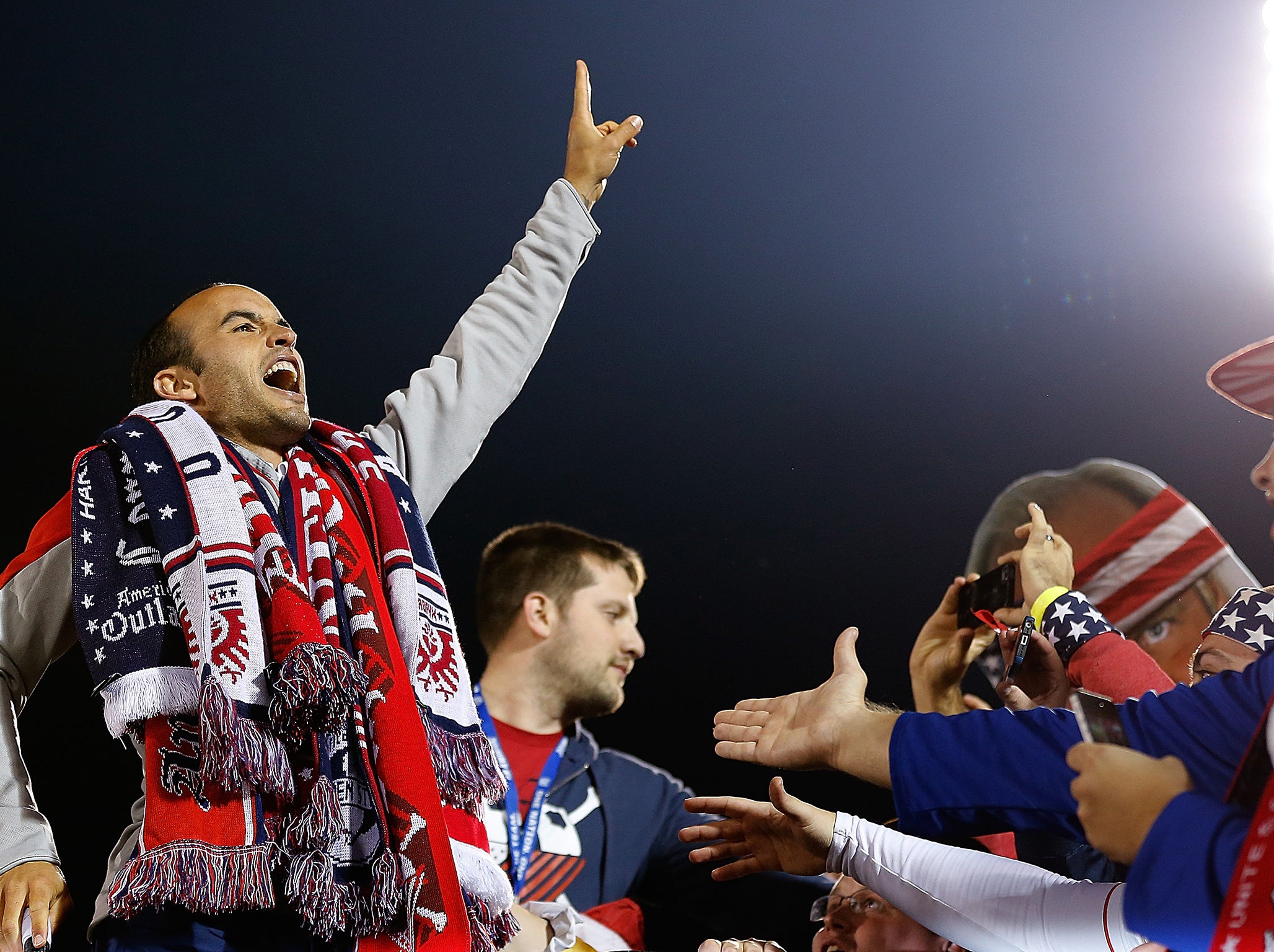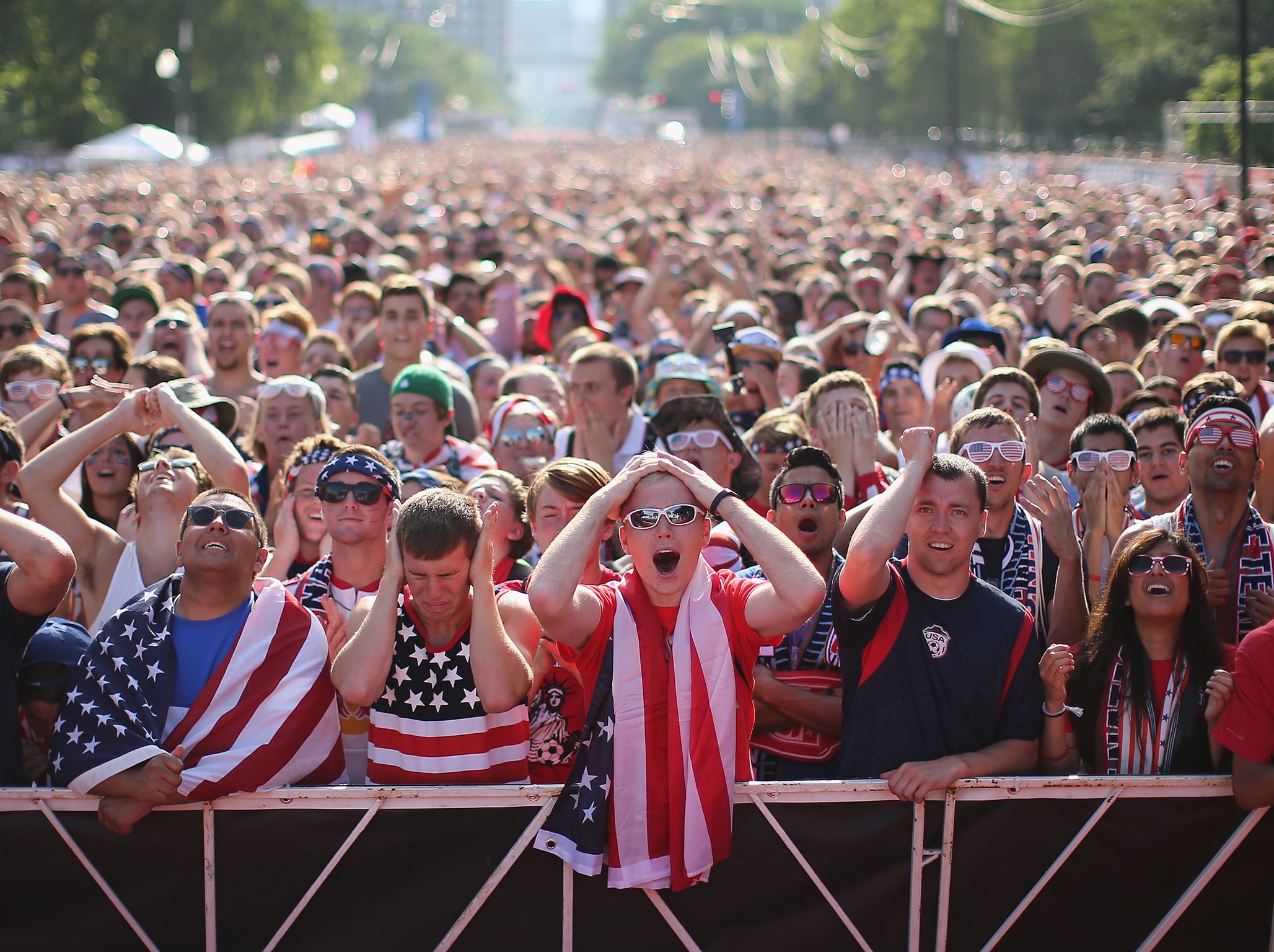Landon Donovan, soccer’s reluctant hero, steps back into the spotlight simply to indulge his love of the game
It is the second time Donovan has come out of retirement, and yet while his decision may have come as little surprise, his destination – Club León in Liga MX – certainly has

Your support helps us to tell the story
From reproductive rights to climate change to Big Tech, The Independent is on the ground when the story is developing. Whether it's investigating the financials of Elon Musk's pro-Trump PAC or producing our latest documentary, 'The A Word', which shines a light on the American women fighting for reproductive rights, we know how important it is to parse out the facts from the messaging.
At such a critical moment in US history, we need reporters on the ground. Your donation allows us to keep sending journalists to speak to both sides of the story.
The Independent is trusted by Americans across the entire political spectrum. And unlike many other quality news outlets, we choose not to lock Americans out of our reporting and analysis with paywalls. We believe quality journalism should be available to everyone, paid for by those who can afford it.
Your support makes all the difference.The knees are not quite what they were in his prime. The hairline has drifted back another couple of inches since we last saw him, like the tide going out. But still they have come in their thousands; not even to see him play, but simply to see him. The club shop has already sold out of replica shirts. The country’s sport channels have cleared their schedules.
And on a balmy night in Leon, out of a fiesta of lights and a blizzard of noise, finally he emerges. He kicks a few footballs into the crowd. He smiles diffidently, thoughtfully, almost as if taking stock. “It was always a dream of mine to play in Mexico,” he says in perfect Spanish. “Now I’m here, to help you all win another championship.”
He poses for photos with a little flag in each hand: one Mexican, one American. “I don’t believe in walls,” he says, a thinly-veiled reference to President Trump. The crowd roars, chanting his name, holding up ‘L’ and ‘D’ signs. At the age of 35, Landon Donovan is back. Again.
It is the second time Donovan has come out of retirement, and yet while his decision may have come as little surprise, his destination certainly has. Liga MX, the top tier of Mexican football, is nobody’s idea of a sedate retirement home. Club Leon, his new employers, are stuffed with current internationals, even a couple of former Premier League players in Mauro Boselli and Giles Barnes. The crowds are large and the expectations sky-high. Is this really a place for an aging midfielder with creaky joints who has not played competitively since 2016?
“It’s my responsibility to show that I can still play football,” Donovan said on his unveiling. “I’m not going to come here and not be successful. It’s not going to happen. When I decide in my mind that I want to do something, I do it.”
Evidently, it is this bottomless well of talismanic stubbornness that has tempted Leon into offering Donovan a healthy salary (£130,000 a month, according to local reports) and a route back into the game. With six MLS titles, four Gold Cups and a clutch of individual awards, Donovan is not only the most decorated American footballer of all time, and the one who has provided more of its unforgettable moments than anyone else.
That header against Mexico in the 2002 World Cup. That breakaway goal against Brazil in the 2009 Confederations Cup. That goal against Algeria in 2010: the moment when it felt like America as a nation finally stepped, blinking and vaguely delirious, into the light of footballing grace.

Donovan has already done it all. And so the question of motivation is, from his perspective, a far harder one to answer. He has a young family - wife Hannah, two kids Talon and Slate - who will have to relocate to Leon with him. He has a burgeoning broadcasting career, business interests in his hometown of San Diego and was even rumoured to be considering running for president of the US Soccer Federation. All that is now on hold.
What makes all of this all the more surprising, when you think about it, is just how unhappy football has made Donovan over the years. Rarely can a player as successful as Donovan looked less like he was enjoying himself. Football wore out his body and ravaged his mental health. It opened him up to more scrutiny, more ridicule, more heartache and more simple hostility than any American player before or since. It broke his heart a thousand times over.
Very little of which, it has to be said, was his fault. For most of the good years - the decade between around 2002 and 2012 - the treatment of Donovan at the hands and fingers of the US footballing public said a lot more about them than it did about him. US soccer was going places in a hurry, and so its various fracturing tribes found themselves caught between the clout of a footballing giant and the cool of an upstart newcomer. That wanted to be noticed, and yet resented being noticed. That craved a bigger stage, yet enjoyed its little niche.

And so into this swirling vortex of contradictions stepped Donovan, who even more than Clint Dempsey and Tim Howard was held up as the genuine superstar of the side, the figurehead who also became a vehicle for an entire sport’s existential angst. Hating on him - whether it was because he was aloof or arrogant or entitled or couldn’t do it in Europe - became a way of distinguishing yourself from the flag-waving newcomers attaching themselves to the team like kelp. It showed you knew about football.
In many ways, Donovan was America’s Steven Gerrard: a mere mortal in a superhero’s body. Too human, too vulnerable, too emotionally complex by far. All-American sporting heroes don’t talk about their depression. All-American sporting heroes don’t miss World Cup qualifiers to go and “find themselves” on an extended sabbatical in Cambodia. Especially not in football, a sport desperately trying to shake off its effete, suburban, middle-class image.
And then came the final, devastating heartbreak. Donovan was left out of the 2014 World Cup squad, despite having done as much as anyone to get them there. It seemed like the end of an era, a line in the sand, a new dawn for a new group of players under Jurgen Klinsmann.

Well, we now know how that turned out. And as the US prepares to sit out the World Cup for the first time in three decades, perhaps the trauma of the 2018 generation helps to cast the achievements of its predecessors in a slightly different light. Perhaps, in hindsight, the age of Donovan and his team-mates constituted something of a golden age, the longest sustained era of growth in the nation’s footballing history, a time when America expected and with remarkable frequency, America delivered.
As for Donovan himself, he is no longer the biggest star in the circus, no longer the great white hope, no longer a vessel for a nation’s sporting neuroses. That’s Christian Pulisic’s problem now. Donovan, meanwhile, can simply indulge his love of the game.
Curiously, he never really seemed that interested in his legacy, even when he was burnishing it at every turn. He never seemed that interested in records or statistics, even as he accumulated caps and goals as easily as ornaments gather dust. He never seemed that interested in being a pioneer or a trailblazer, even as he became the single most recognisable face in American soccer.
And even now, you could argue this is hardly the smartest move for him. He surely has nothing left to prove at this level. There has already been a little native hostility over his pay packet and his chequered history with the Mexican fans (think Theo Walcott taunting Spurs supporters from his stretcher). The prospect of failure is, he says “one of the first things that came to mind.”
But then, Donovan doesn’t believe in walls. And to be honest, never really came across as the most strategic of players. There’s a ball, there’s a contract, and the rest can take care of itself later. And so as he drank in the rapturous applause of the Estadio Leon, a ball at his feet, a green jersey on his back, it was possible to glimpse the glorious abandon of the true addict. The sort who can never truly resist one last challenge. One more irresistible struggle. One more delicious slice of footballing pain.
Join our commenting forum
Join thought-provoking conversations, follow other Independent readers and see their replies
Comments